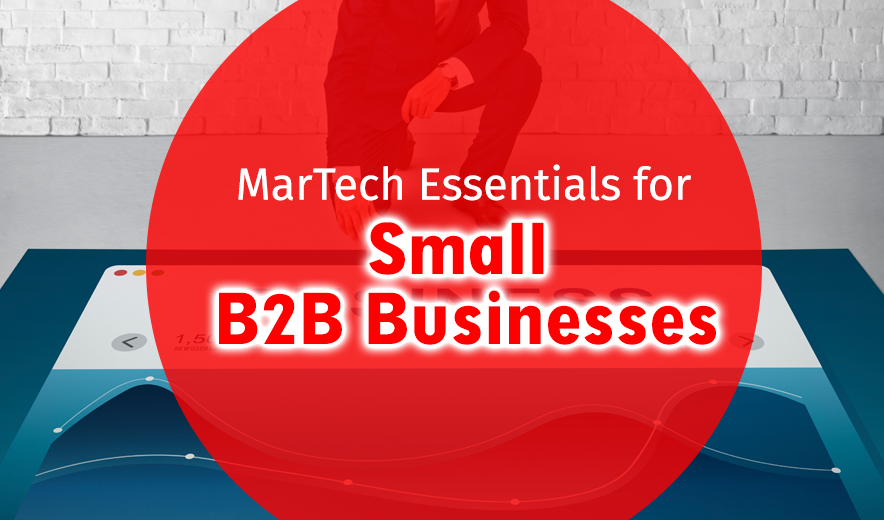Marketing Technology (MarTech) holds profound importance for B2B businesses, especially smaller ones, in today’s digital landscape. One of the primary advantages lies in its ability to optimize resource utilization. Smaller B2B enterprises often face constraints in terms of manpower and budget. MarTech tools alleviate these limitations by automating repetitive tasks, allowing these businesses to achieve more with fewer resources. Automation streamlines marketing processes, data analysis, and customer engagement efforts, boosting operational efficiency without draining limited budgets or human resources.
Through advanced segmentation tools, these businesses can precisely define their audience based on industry specifics, behavioral patterns, or demographics. By tailoring marketing messages to these specific segments, B2B businesses can create more impactful and meaningful connections. Personalization not only increases the likelihood of conversions but also fosters stronger and long-lasting relationships with clients.
Robust analytics and reporting features provide valuable insights into customer behavior and campaign performance. Armed with this data, smaller businesses can refine their strategies, ensuring that marketing efforts are strategically aligned with what resonates most with their target audience. This analytical approach not only maximizes the impact of marketing campaigns but also helps in adapting strategies based on real-time feedback and trends.
Tools like Customer Relationship Management (CRM) systems and marketing automation platforms enable businesses to capture leads effectively, monitor their interactions, and nurture them through personalized communication. This systematic approach ensures that potential leads are not just identified but also guided through the sales funnel, increasing the probability of conversions.
Digital marketing through MarTech tools is often more economical than traditional marketing methods. The ability to choose from a variety of affordable options ensures that smaller businesses can engage in sophisticated marketing strategies without incurring exorbitant costs, thereby maximizing their return on investment.
MarTech provides smaller B2B businesses with a competitive edge. By offering access to advanced tools and technologies, MarTech levels the playing field, allowing these businesses to compete effectively with larger counterparts. It ensures that they can reach and engage potential clients without being overshadowed, creating opportunities for growth and expansion.
These solutions are designed with scalability in mind. As smaller B2B businesses expand, their marketing needs evolve. MarTech tools are often scalable, allowing businesses to adapt and expand their marketing efforts in tandem with their growth. This adaptability ensures that marketing strategies remain effective and relevant, regardless of the business’s size or stage of development.
In essence, MarTech empowers smaller B2B businesses by optimizing resources, enhancing targeting and personalization, enabling data-driven decisions, improving lead generation, offering cost-effective solutions, providing a competitive edge, and ensuring scalability. By leveraging MarTech effectively, these businesses can navigate the complexities of the digital landscape, reach their target audience, and achieve sustainable growth and success.
Essential MarTech Tools
1. Customer Relationship Management (CRM) Systems
CRM systems, like Salesforce and HubSpot, help businesses organize and manage customer data. They store valuable information, track interactions, and provide insights for personalized communication. CRM tools enhance efficiency by centralizing customer information, improving lead management, and fostering better customer relationships. Studies have shown that businesses using CRM systems experience an average ROI of $8.71 for every dollar spent (source: Nucleus Research).
2. Marketing Automation Platforms
Tools like Marketo and Pardot automate repetitive marketing tasks, such as email marketing, social media posting, and lead nurturing. Marketing automation boosts efficiency by saving time and ensuring timely, targeted communication. Research indicates that companies using marketing automation to nurture leads experience a 451% increase in qualified leads (source: The Annuitas Group).
3. Web Analytics Tools
Web analytics platforms, such as Google Analytics and Adobe Analytics, provide insights into website traffic, user behavior, and content performance. They help businesses understand customer preferences, optimize user experience, and refine marketing strategies. Studies reveal that organizations using web analytics effectively are more than twice as likely to outperform their peers in terms of revenue growth (source: McKinsey & Company).
4. Social Media Management Tools
Tools like Hootsuite and Sprout Social enable businesses to manage multiple social media accounts, schedule posts, and analyze engagement metrics. Social media management tools enhance efficiency by streamlining social media marketing efforts and increasing brand visibility. Businesses utilizing social media effectively experience a 78% higher ROI than their competitors (source: Aberdeen Group).
5. Content Marketing Platforms
Content marketing tools like WordPress and Contentful facilitate content creation, distribution, and performance analysis. They help businesses create engaging content, reach their target audience, and measure content effectiveness. Research shows that content marketing generates three times as many leads as traditional outbound marketing, resulting in a higher ROI (source: Demand Metric).
6. Email Marketing Software
Email marketing tools like Mailchimp and SendGrid automate email campaigns, track open rates, and analyze user engagement. Email marketing software improves efficiency by delivering personalized messages and measuring campaign success. Studies indicate that email marketing has an average ROI of 42:1, meaning businesses earn $42 for every dollar spent on email marketing (source: DMA).
7. Search Engine Optimization (SEO) Tools
SEO tools like SEMrush and Moz help businesses optimize their websites for search engines, increase organic traffic, and analyze competitors. SEO tools enhance efficiency by identifying high-performing keywords and optimizing content. Businesses with strong SEO strategies experience a 14.6% conversion rate, leading to higher ROI (source: Search Engine Journal).
The impact of these MarTech tools on ROI and efficiency is substantial. Businesses that leverage CRM systems, marketing automation, analytics, social media management, content marketing platforms, email marketing software, and SEO tools effectively experience improved efficiency, targeted marketing efforts, and higher ROI. By investing in these tools, businesses can optimize their marketing strategies, increase productivity, and achieve significant returns on their marketing investments.
What role can a CRM play in an effective Martech Stack
In the realm of Marketing Technology (MarTech), a Customer Relationship Management (CRM) system assumes a pivotal role within the broader marketing stack. Its significance lies in its ability to act as a centralized repository of customer data. By housing information on leads, prospects, and existing clients, a CRM system ensures that marketing activities are rooted in accurate and up-to-date insights. This centralized data hub facilitates a nuanced understanding of customer behavior, enabling businesses to craft highly targeted and personalized marketing campaigns.
A CRM system enhances customer segmentation capabilities. By categorizing customers based on demographics, behavior, or purchase history, businesses can tailor their marketing messages to specific segments. This precision ensures that marketing efforts are not only well-directed but also resonate deeply with the intended audience.
Integration is another key aspect. CRM systems seamlessly integrate with various marketing tools, ensuring smooth data flow between the CRM and platforms like email marketing software, social media platforms, and marketing automation tools. This integration guarantees that marketing strategies are based on the most recent customer interactions and preferences, fostering a cohesive and coordinated approach across all channels.
CRM systems play a vital role in lead management. By tracking the entire customer journey and prioritizing leads based on their interactions and likelihood of conversion, businesses can optimize their sales and marketing efforts. This focus on high-potential leads significantly improves conversion rates and, subsequently, the return on investment (ROI) of marketing campaigns.
It empowers data-driven decision-making. By generating comprehensive reports and analytics, marketers gain valuable insights into customer behavior and trends. These insights enable businesses to refine their strategies, optimize campaigns, and allocate resources effectively, leading to higher ROI and improved overall efficiency.
It contributes significantly to customer retention and loyalty. By leveraging the wealth of customer data, businesses can engage in proactive communication, offer personalized promotions, and address customer needs effectively. This personalized approach enhances customer satisfaction, fostering stronger customer relationships, higher retention rates, and increased loyalty.
A CRM system serves as the linchpin of an effective MarTech strategy. Its ability to centralize data, facilitate integration, enable personalized marketing, support data-driven decisions, and enhance customer relationships makes it indispensable for businesses aiming to maximize their marketing efficiency and ROI.
Choosing the Right MarTech Stack
Selecting the right Marketing Technology (MarTech) stack is crucial for the success of a small B2B business. Here’s a step-by-step guide to help you choose the best MarTech stack tailored to your specific needs:
1. Assess Your Needs
Begin by understanding your business goals, target audience, and marketing objectives. Identify the specific challenges you face in your marketing efforts. Are you looking to improve lead generation, enhance customer engagement, or streamline your marketing processes? Clear objectives will guide your MarTech choices.
2. Research Thoroughly
Explore the available MarTech options. Look for platforms and tools that align with your objectives. Take into account aspects like user-friendliness, scalability, customer support, and integration capabilities. Read case studies and success stories of businesses similar to yours to gain insights into their MarTech adoption journeys.
3. Evaluate Integration Capabilities
One of the most critical aspects of a MarTech stack is its ability to integrate seamlessly. Choose tools that can work together cohesively. For instance, ensure your Customer Relationship Management (CRM) system can integrate with your email marketing software and analytics tools. Integration helps reduce data silos and improves overall efficiency.
4. Consider Scalability
As your business grows, your MarTech needs will evolve. Opt for solutions that are scalable and can accommodate your expanding requirements. Scalable MarTech tools allow for smooth transitions and prevent the need for a complete overhaul of your stack as your business expands.
5. Prioritize User Experience
A user-friendly interface is essential, especially if you have a small team with limited technical expertise. Intuitive tools not only reduce training time but also ensure that your team can make the most out of the features available, maximizing the value of your MarTech investment.
6. Seek Expert Advice
Consult with MarTech experts or hire a consultant if necessary. They can provide valuable insights based on your specific industry and business size. Learning from experts and successful implementation stories can help you avoid common pitfalls and make informed decisions.
7. Test and Optimize
Before committing to any MarTech tool, request a demo or trial period. Test the functionalities and evaluate how well the tool meets your requirements. Gather feedback from your team during the trial phase. Based on their input, optimize your choice or explore alternatives if necessary.
8. Start with Essentials
Begin with fundamental tools that address your immediate needs. A CRM system, email marketing software, and basic analytics tools are often a good starting point for small B2B businesses. Once you’ve mastered these essentials, you can gradually incorporate more specialized tools into your stack.
9. Monitor ROI and Adapt
After implementing your MarTech stack, closely monitor its impact on your business. Track key performance indicators (KPIs) such as lead conversion rates, customer engagement, and overall ROI. Regularly assess the effectiveness of your tools and be willing to adapt. MarTech is not static; it evolves, and your stack should evolve with it to stay efficient and effective.
Incorporating insights from successful MarTech adoption stories can provide valuable guidance. For instance, companies like HubSpot and Mailchimp have documented how their integrated MarTech stacks have transformed their marketing efforts, leading to significant increases in lead generation and customer engagement. Studying such success stories can offer real-world examples of how the right MarTech stack can drive positive outcomes for small B2B businesses.
Remember, selecting the best MarTech stack is not a one-size-fits-all process. It requires careful consideration of your unique business needs and objectives. By following these steps and staying informed about industry trends and success stories, you can make informed decisions that will empower your small B2B business to thrive in the digital landscape.
Overcoming Resource Constraints
Implementing Marketing Technology (MarTech) within budget constraints requires a strategic approach. Here are some data-driven strategies tailored for small businesses:
1. Prioritize Essential Tools
Identify the core tools essential for your business objectives. A Customer Relationship Management (CRM) system and email marketing platform are fundamental. Focus your budget on these tools initially, ensuring they align with your primary goals like lead generation and customer retention.
2. Leverage Free and Freemium Tools
Many MarTech platforms offer free or low-cost versions of their services. For instance, Google Analytics provides robust website analytics for free. Explore these options; they can fulfill essential functions without straining your budget.
3. ROI-Focused Investment
Prioritize tools that offer a clear and measurable return on investment (ROI). For instance, invest in marketing automation platforms that enhance lead nurturing. Data consistently shows that businesses using marketing automation experience higher conversion rates and revenue growth, ensuring a positive ROI.
4. Data-Driven Decision Making
Utilize data analytics to optimize your marketing efforts. Tools such as Google Analytics and social media insights offer valuable data. Analyze customer behavior, website traffic, and engagement metrics to refine your strategies. Data-driven decisions maximize the impact of your marketing activities, ensuring efficient resource allocation.
5. Embrace DIY Content Creation
Content is a powerful marketing tool. Create engaging content in-house using user-friendly tools like Canva for graphics and social media posts. DIY content creation minimizes outsourcing costs, allowing you to invest your budget in other essential MarTech areas.
Benefits of Cloud-Based Solutions for Small Businesses
1. Cost-Effectiveness:
Cloud-based MarTech solutions eliminate the need for substantial upfront investments in hardware and software. Small businesses can access powerful tools through subscription models, reducing initial costs significantly.
2. Scalability:
Cloud solutions are highly scalable. As your business grows, you can easily upgrade your subscription or add new features. This scalability ensures that your MarTech tools can adapt to your evolving needs without hefty expenses or disruptions.
3. Accessibility and Collaboration:
Cloud-based platforms are accessible from anywhere with an internet connection. This flexibility enables remote work and collaboration among team members, fostering efficiency and productivity, especially in small, dynamic teams.
4. Automatic Updates:
Cloud solutions are automatically updated by the providers, ensuring you always have access to the latest features and security enhancements. This eliminates the burden of manual updates and maintenance tasks, saving time and effort for your team.
5. Enhanced Security:
Reputable cloud providers invest heavily in security measures. Your data is encrypted, and providers employ strict access controls and backup protocols. Cloud solutions often offer better data protection than on-premise systems, ensuring the safety of your business information.
Leveraging cloud-based MarTech solutions not only overcomes budget constraints but also provides small businesses with cost-effective, scalable, accessible, secure, and updated tools. Coupled with strategic planning and data-driven decision-making, these solutions empower small businesses to compete effectively and thrive in the digital landscape without breaking the bank.
By leveraging tools like CRM systems, marketing automation, and analytics, these businesses optimize their marketing efforts efficiently. MarTech levels the playing field, enabling personalized interactions and data-driven decisions. With strategic planning and cloud-based solutions, even on a budget, small B2B businesses can thrive, creating meaningful client relationships and driving remarkable growth. MarTech isn’t just a tool; it’s the catalyst for success in the competitive digital landscape.
Be a part of our community for free and access the best resources, trends, and new technologies from peers and industry experts. You can also check out our other awesome blogs over here.





